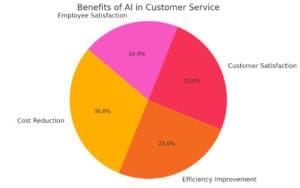Revolutionizing Customer Service with AI: The Future of Intelligent Support
Customer service has undergone a dramatic transformation in recent years, largely thanks to the rapid advancements in artificial intelligence (AI) technology. As businesses strive to meet the ever-growing demands of their customers, AI has emerged as a game-changing solution that’s reshaping the landscape of customer support. In this comprehensive guide, we’ll explore how AI is revolutionizing customer service, its benefits, implementation strategies, and real-world applications.
The Rise of AI in Customer Service
Artificial intelligence has become an indispensable tool for businesses looking to streamline their customer service operations and provide superior experiences. As customer expectations continue to evolve, companies are turning to AI-powered solutions to stay ahead of the curve.
Why AI Matters in Customer Support
AI technology offers several key advantages that make it particularly well-suited for customer service applications:
- 24/7 Availability: AI-powered chatbots and virtual assistants can provide round-the-clock support, ensuring customers receive help whenever they need it.
- Scalability: AI systems can handle multiple customer interactions simultaneously, allowing businesses to manage high volumes of inquiries without sacrificing quality.
- Consistency: AI ensures uniform responses and adherence to company policies, reducing the risk of human error.
- Personalization: By analyzing customer data, AI can deliver tailored experiences and recommendations.
- Efficiency: AI can quickly process and categorize customer inquiries, routing them to the appropriate department or solution.
Key AI Technologies Transforming Customer Service
Several AI technologies are at the forefront of this customer service revolution:
1. Natural Language Processing (NLP)
NLP enables machines to understand and interpret human language, both written and spoken. This technology powers chatbots and virtual assistants, allowing them to engage in natural conversations with customers.
2. Machine Learning (ML)
ML algorithms analyze vast amounts of data to identify patterns and make predictions. In customer service, ML can be used to:
- Anticipate customer needs based on past interactions
- Recommend products or solutions
- Identify potential issues before they escalate
3. Sentiment Analysis
This technology helps businesses understand the emotions behind customer messages, allowing them to prioritize urgent issues and tailor their responses accordingly.
4. Computer Vision
Computer vision technology can analyze images and videos, enabling visual customer support for industries like manufacturing or retail.
Benefits of AI-Powered Customer Service
Implementing AI in customer service offers numerous advantages for both businesses and customers:
For Businesses:
- Cost Reduction: AI can handle a significant portion of customer inquiries, reducing the need for large support teams.
- Improved Efficiency: AI systems can quickly process and categorize inquiries, ensuring faster resolution times.
- Data-Driven Insights: AI analytics provide valuable insights into customer behavior and preferences, informing business decisions.
- Enhanced Employee Satisfaction: By handling routine tasks, AI frees up human agents to focus on more complex and rewarding work.
For Customers:
- Faster Response Times: AI-powered systems can provide instant responses to common queries.
- 24/7 Support: Customers can get help anytime, anywhere, without being limited by business hours.
- Personalized Experiences: AI can tailor interactions based on customer history and preferences.
- Consistent Service: AI ensures uniform quality across all interactions, regardless of time or channel.
Implementing AI in Customer Service: Best Practices
To successfully integrate AI into your customer service strategy, consider the following best practices:
- Start Small: Begin with a pilot program to test AI solutions and gather feedback before full-scale implementation.
- Choose the Right Use Cases: Identify areas where AI can have the most significant impact, such as handling frequently asked questions or routing inquiries.
- Maintain a Human Touch: Use AI to augment human agents rather than replace them entirely. Ensure seamless handoffs between AI and human support when needed.
- Prioritize Data Quality: Ensure your AI systems are trained on accurate, up-to-date data to provide reliable assistance.
- Continuously Monitor and Improve: Regularly analyze AI performance and customer feedback to refine and enhance your AI-powered support.
Real-World Applications of AI in Customer Service
AI is already making a significant impact across various industries:
E-commerce
Online retailers use AI-powered chatbots to assist customers with product recommendations, order tracking, and returns processing. For example, H&M’s chatbot helps customers find products and creates outfits based on user preferences.
Banking and Finance
AI-powered virtual assistants help customers with account inquiries, fund transfers, and financial advice. Bank of America’s virtual assistant, Erica, has handled over 1 billion client interactions since its launch.
Telecommunications
Telecom companies use AI to predict and prevent network issues, personalize customer experiences, and provide self-service options. Vodafone’s TOBi chatbot handles millions of customer interactions across multiple countries.
Healthcare
AI-powered systems help patients schedule appointments, answer medical questions, and provide post-treatment follow-ups. Babylon Health’s AI-powered app offers symptom checking and virtual consultations.
| Industry | Application | Example | Benefits |
|---|---|---|---|
| E-commerce | Product recommendations, order tracking | H&M chatbot | Improved customer experience |
| Banking & Finance | Account inquiries, fund transfers | Bank of America’s Erica | Faster response times |
| Telecommunications | Predicting network issues, self-service options | Vodafone’s TOBi | Enhanced efficiency and satisfaction |
| Healthcare | Scheduling, medical questions | Babylon Health’s app | Better patient engagement and support |
The Future of AI in Customer Service
As AI technology continues to evolve, we can expect to see even more innovative applications in customer service:
- Predictive Support: AI systems will anticipate customer needs and proactively offer solutions before issues arise.
- Emotional Intelligence: Advanced AI will better understand and respond to customer emotions, providing more empathetic support.
- Augmented Reality (AR) Integration: AI-powered AR solutions will enable visual remote assistance for complex product issues.
- Voice-Activated Support: As voice recognition technology improves, AI assistants will become more prevalent in customer service interactions.
Overcoming Challenges and Ethical Considerations
While AI offers tremendous potential, it’s essential to address potential challenges:
- Data Privacy: Ensure compliance with data protection regulations and maintain transparency about AI use.
- Bias Mitigation: Regularly audit AI systems to identify and eliminate potential biases in decision-making.
- Job Displacement Concerns: Focus on reskilling employees to work alongside AI systems rather than replacing them entirely.
- Maintaining the Human Element: Strike a balance between AI efficiency and the need for human empathy in customer interactions.
Conclusion
AI is undeniably transforming the landscape of customer service, offering unprecedented opportunities for businesses to enhance efficiency, reduce costs, and improve customer satisfaction. By embracing AI-powered solutions and following best practices for implementation, companies can stay ahead of the curve and deliver exceptional customer experiences in the digital age.
As we look to the future, the continued evolution of AI technology promises even more exciting developments in customer service. By staying informed about these advancements and adapting strategies accordingly, businesses can ensure they remain at the forefront of customer support excellence.



